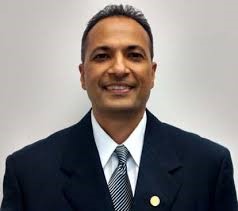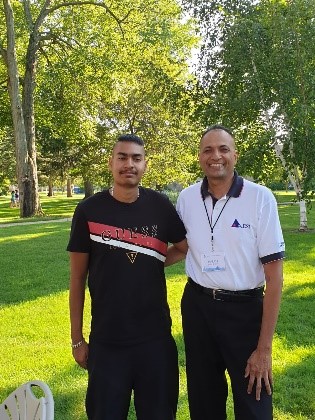As knowledge workers, the rise of AI presents a critical challenge: ensuring it empowers us, not replaces us or erodes our autonomy. We must swiftly secure legal protections, strong legislation, and robust collective bargaining to protect our jobs and independence. Through increased employee engagement and collaboration, I’m confident we can tackle this challenge and build a stronger future together.

I was born in Trinidad and Tobago and immigrated to Canada to pursue my education. I first moved to Alberta, where I attended university, and eventually settled in Ontario, where I started a family. My greatest pride and joy is my son, Lucas.
Growing up in a large family, I learned the value of strength in numbers, a lesson that has shaped my involvement in the Society, where we operate as one united family. I’ve served on various boards and committees, and my education in engineering, law, and business has made me effective in these roles. With experience across mining, pulp and paper, legal and energy industries I offer this expertise to support our membership.

About Me
General Questions for all Principal Officers
1. How should the Society become more involved in the broader labour movement?
It is crucial for the Society to establish a presence at the national, provincial, and community levels. Membership in the International Federation of Professional and Technical Engineers links us to 80,000 workers in professional, technical, administrative, and related fields across Canada. Similarly, our affiliate membership in the Canadian Labour Congress, Ontario Federation of Labour, and various District Labour Councils connects us to over 3 million workers in Canada. Through these organizations, we can coordinate the interests of our members to advocate for change at the governmental level, enhance our political leverage, and maximize benefits.
2. What changes would you make to provide more effective services to our members?
·Lobbying Government: Advocating for government support to expand Legal Aid services and promote nuclear energy development as a clean, sustainable resource for future energy needs.
· Reporting: Analyzing key arbitration awards and court decisions, ensuring members across all locals are informed and up to date on significant legal precedents.
· Communication: Strengthening cross-local collaboration during labor actions, advancing equity-seeking initiatives, and organizing activities to boost member engagement and solidarity.
· Member Education: Providing workshops and training to deepen members’ knowledge of their rights, collective bargaining, and the union’s role, empowering them to actively engage in the Society’s initiatives and foster solidarity.
3. How would you assist bargaining units in the transformation to the new governance structure?
The reduction from four to three Principal Officers brings up key questions regarding the distribution of responsibilities. In this new structure, the former duties of the VP of Finance are now divided among the President, Secretary-Treasurer, and Executive Vice President. I will work closely with the Executive Committee to ensure that our strategies are thoroughly discussed and communicated, empowering Local Vice Presidents and the entire membership to share up-to-date information on how we can align our efforts to achieve our collective mission. By doing so, we strengthen our position as the union of choice for all members.
4. How would you help to coordinate collective agreement negotiations across Society bargaining units to achieve the best results for the individual bargaining units and for the Society as a whole?
Employers continually seek to undermine the rights and entitlements of our members. I firmly believe that the Society must prioritize coordinated bargaining efforts to share best practices, ensuring greater success in collective negotiations. The Bargaining Coordination Committee is a key tool in achieving this. Through this Committee, we can analyze evolving legislation, arbitration decisions, and bargaining trends across the country, assessing their impact on our members. Additionally, it offers the opportunity to collaborate with allies in the broader labour movement to protect industry-wide gains.
5. How would you, in the context of your specific role, work to advance the Society’s strategic plan.
I will work with Local Vice Presidents to create guides for bargaining preparation and engagement. These guides will be tailored to the specific needs of each Local and will include tools for step-by-step preparation, such as member surveys, proposal development, finances, and strategies for member engagement and mobilization. I will also conduct hands-on training sessions and workshops to improve negotiation skills. Additionally, I will ensure that the guides are regularly updated to reflect changes in legislation and bargaining trends, so that Locals can effectively advocate for their members and achieve the best possible outcomes.
Executive Vice-President
1. Mentorship and succession planning is necessary to help keep our union strong and effective today and into the future. If you were asked to mentor and coach Local Vice Presidents in their role, what approach would you take?
My approach would start with a needs assessment to identify any knowledge or experience gaps for newly appointed LVPs, followed by tailored resources to address these areas. Regular meetings would provide ongoing support throughout their transition. For more experienced LVPs, I would facilitate the exchange of best practices, such as successful social media strategies from one local, to benefit others. I would also develop updated bargaining guidelines to strengthen negotiation skills. Additionally, significant arbitration awards and court decisions would be analyzed, and legal precedents communicated to ensure insights are shared across all locals.
2. One responsibility of the Executive Vice President is to determine if a Grievance should advance beyond step two to Arbitration. What grievance experience do you bring to the role, how would this previous experience shape your decisions, and what resources would you leverage to make an informed and fair decision for every member?
My background as a lawyer enables me to engage effectively with Society Staff Officers and legal counsel on the merits of advancing cases. As Unit Director, I developed a strong foundation of legal knowledge from sources such as Lancaster House and the Law Society of Ontario. As a former member of the Grievance Coordination Committee (OPG Local), I contributed to case discussions and progression decisions. My expertise in labor law and success assessment informs my judgment. Additionally, I have gained valuable experience in mediations and arbitrations, collaborating closely with Staff Officers and external counsel.
3. Training is an important responsibility of the EVP. What types of training do you feel the Society’s elected representatives would benefit from and what ideas do you have to improve the Society’s training program?
Training programs should be enhanced to support vulnerable workers’ return to the workplace by addressing key topics such as supportive return-to-work strategies, psychological health and safety, risk factors, and legal responsibilities under the Duty to Accommodate. Training should also clarify the roles of workplace parties in a successful return. Additionally, as remote work becomes more prevalent, training must focus on psychological health and safety risks in virtual environments and strategies for maintaining work-life balance. Finally, as employee surveillance through employer systems becomes more common, training should address privacy concerns and ensure balance between monitoring productivity and respecting worker autonomy.
Campaign Questions
Education and Experience
EDUCATION
Osgoode Hall Law School, York University, Toronto, Ontario – Master of Laws – LL.M (2017)
Andrews University, Berrien Springs, Michigan, USA – Doctorate – Ph.D. (2013)
Wilfrid Laurier University, Waterloo, Ontario – Master Business Administration – MBA (2004)
University of Manitoba, Winnipeg, Manitoba – Law Degree – J.D. (1997)
University of Alberta, Edmonton, Alberta, Bachelor of Chemical Engineering – B.Sc. (1990)
CONTINUING EDUCATION
Certificate in Labour Law Osgoode Hall Law School Professional Development (2017)
SOCIETY INVOLVEMENT
Delegate: Ontario Power Generation Pickering Nuclear, Pickering (2008-2016)
Unit Director: Ontario Power Generation Pickering Nuclear, Pickering (2016-Present)
Committee Memberships:
Society Persons with Disability Committee (2020-Present)
Society Board member and alternative Society Board Member (2016-Present)
OPG Local Bargaining Committee (2018, 2021)
Society Education Committee (2017-Present)
Grievance Coordination Committee OPG Local intermittent (2016-2023)
Pickering Equity, Diversity and Inclusion Committee (2009-2022)
OPG Local Pickering Pension Committee (circa 2019-2020)
Employee Family Assistance Program (2023-Current)
Regulatory Affairs Group Canadian Nuclear Safety Commission (2016 – current)
Ontario Energy Board Group (2016 – 2022)
NON-SOCIETY INVOLVEMENT
Professional Engineer, Professional Engineers Ontario (2001-Present)
Lawyer, Law Society of Ontario (2004-Present) providing pro-bono legal services
Board Member, White Ribbon Foundation (prevent violence against women) (2009-2013)
Served as Alternate Vice President, Workers of Color, Ontario Federation of Labour
Seved as Delegate and Equity Committee Member, Toronto & York Region Labour Council
Adjunct Professor, Department of Leadership, Andrews University (2018 – Present)
I wholeheartedly support the candidate running for union officer. Their dedication and vision for our community are truly inspiring. Vote for positive change!
John Doe